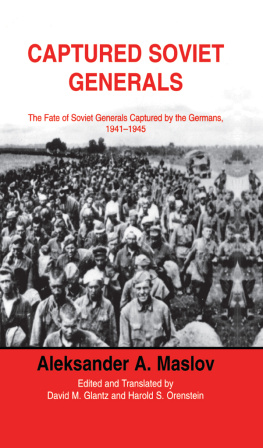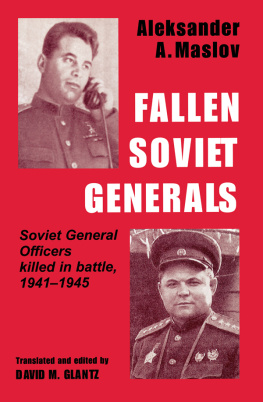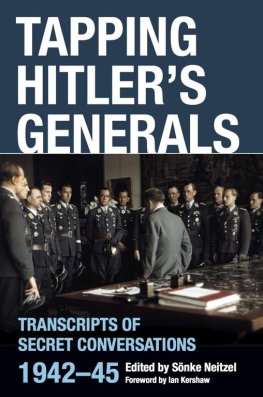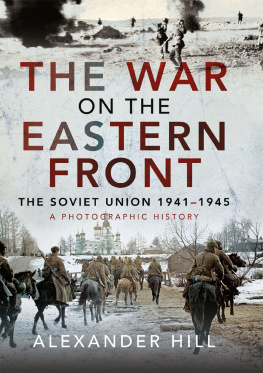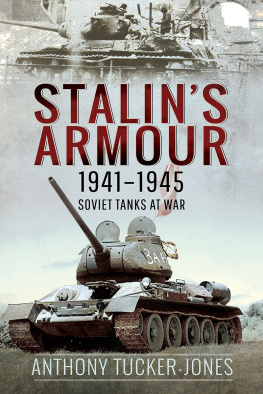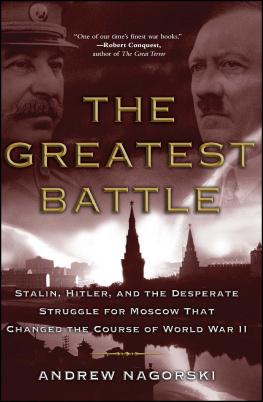CASS SERIES ON SOVIET (RUSSIAN) MILITARY INSTITUTIONS
CAPTURED SOVIET GENERALS
CASS SERIES ON SOVIET (RUSSIAN) MILITARY INSTITUTIONS
Series Editor: David M. Glantz
ISSN 1462-1835
This series examines the nature and evolution of Soviet military institutions in peace and war and the human dimension of the Soviet Army.
1. Aleksander A. Maslov, translated and edited by David M. Glantz, Fallen Soviet Generals: Soviet General Officers Killed in Battle, 19411945. (ISBN 0 7146 4790 X cloth, 0 7146 4346 7 paper)
2. Aleksander A. Maslov, translated and edited by David M. Glantz and Harold S. Orenstein, Captured Soviet Generals: The Fate of Soviet Generals Captured by the Germans, 19411945. (ISBN 0 7146 5124 9)
3. John Erickson, The Soviet High Command: A Military-Political History, 19181941. (ISBN 0 7146 5178 8)
CASS SERIES ON SOVIET (RUSSIAN) STUDY OF WAR
Series Editor: David M. Glantz
ISSN 1462-0960
This series examines what Soviet military theorists and commanders have learned from the study of their own military operations.
1. Harold S. Orenstein, translator and editor, Soviet Documents on the Use of War Experience, Volume I, The Initial Period of War 1941, with an Introduction by David M. Glantz. (ISBN 0 7146 3392 5 cloth)
2. Harold S. Orenstein, translator and editor, Soviet Documents on the Use of War Experience, Volume II, The Winter Campaign 19411942, with an Introduction by David M. Glantz. (ISBN 0 7146 3393 3 cloth)
3. Joseph G. Welsh, translator, Red Armor Combat Orders: Combat Regulations for Tank and Mechanized Forces 1944, edited and with an Introduction by Richard N. Armstrong. (ISBN 0 7146 3401 8 cloth)
4. Harold S. Orenstein, translator and editor, Soviet Documents on the Use of War Experience, Volume III, Military Operations 1941 and 1942, with an Introduction by David M. Glantz. (ISBN 0 7146 3402 6 cloth)
5. William A. Burhans, translator, The Nature of the Operations of Modern Armies by V. K. Triandafillov, edited by Jacob W. Kipp, with an Introduction by James J. Schneider. (ISBN 0 7146 4501 X cloth, 0 7146 4118 9 paper)
6. Harold S. Orenstein, translator, The Evolution of Soviet Operational Art,19271991:The Documentary Basis, Volume I, Operational Art, 19271964, with an Introduction by David M. Glantz. (ISBN 0 7146 4547 8 cloth, 0 7146 4228 2 paper)
7. Harold S. Orenstein, translator, The Evolution of Soviet Operational Art,19271991:The Documentary Basis, Volume II, Operational Art, 19651991, with an Introduction by David M. Giantz. (ISBN 0 7146 4548 6 cloth, 0 7146 4229 0 paper)
8. Richard N. Armstrong and Joseph G. Welsh, Winter Warfare: Red Army Orders and Experiences. (ISBN 0 7146 4699 7 cloth, 0 7146 4237 1 paper)
9. Lester W. Grau, The Bear Went Over the Mountain: Soviet Combat Tactics in Afghanistan. (ISBN 0 7146 4874 4 cloth, 0 7146 4413 7 paper)

First published in 2001 by Frank Cass Publishers
This edition published 2011 by Routledge
2 Park Square, Milton Park, Abingdon, Oxon, OX14 4RN
Simultaneously published in the USA and Canada by Routledge
711 Third Avenue, New York, NY 10017
Routledge is an imprint of the Taylor & Francis Group, an informa business
Copyright 2001 Aleksander A. Maslov
British Library Cataloguing in Publication Data
Maslov, Aleksander A., 1961
Captured Soviet generals: the fate of Soviet generals
captured by the Germans, 19411945. (Cass series on
Soviet (Russian) military institutions; no. 2)
1. Generals Soviet Union 2. World War, 19391945
Prisoners and prisons, German
I. Title II. Glantz, David M. III. Orenstein, Harold S.
(Harold Steven), 1948
940.54009247
ISBN 0-7146-5124-9 (cloth)
ISSN 1462-1835
Library of Congress Cataloging-in-Publication Data
Maslov, Aleksander A., 1961
Captured Soviet generals: the fate of Soviet generals
captured by the Germans, 19411945 / Aleksander A. Maslov;
translated and edited by David M. Glantz and Harold S. Orenstein.
p. cm (Cass series on Soviet (Russian) military
institutions, ISSN 14621835; 2)
Includes bibliographical references and index.
ISBN 0-7146-5124-9 (cloth)
1. World War, 19391945 Prisoners and prisons, German. 2.
GeneralsSoviet Union. 3. WorldWar, 19391945 Atrocities.
4. World War, 19391945 Forced repatriation. I. Glantz, David M.
II. Orenstein, Harold S. (Harold Steven),1948 . III. Title.
IV. Series.
D805.G3M395 2001
940.547243-dc21
2001028004
All rights reserved. No part of this publication may be reproduced, stored in or introduced into a retrieval system or transmitted in any form or by any means, electronic, mechanical, photocopying, recording or otherwise, without the prior mitten permission of the publisher of this book.
Contents
It is indeed tragic that, at the beginning of a new millennium, major issues relating to the twentieth centurys most terrible war remain obscure, if not totally ignored. No war has been more costly in either human or material terms than the Second World War, and no segment of that war was so bloody, cruel, and devastating than the SovietGerman struggle. The war on the German Eastern Front witnessed the outright destruction, maiming, or imprisonment of well over 50 million inhabitants of the Soviet Union and the loss of over 30 million Red Army officers and soldiers, either killed, wounded, taken captive, or missing in action. When the final gruesome tally is complete, the number of Soviet military dead may well number in excess of 14 million souls. Among that incredible number were the over four million officers and soldiers who were captured by the Wehrmacht and incarcerated in German prisoner-of-war camps, many of whom perished during their trying ordeal.
The magnitude of this tragedy alone requires that their story be told. Compounding the devastating effects captivity had on these unfortunate men is the fact that, after their return to the Soviet Union, their suffering often continued. Stalinist paranoia and vindictiveness equated capture on the battlefield with cowardice or treason; hence many returning Soviet prisoners-of-war fell victim to Stalinist repression and retribution. The most unfortunate of these survivors of the Nazi ordeal ended their lives enduring a Soviet ordeal in the infamous GULAG.
After the wars end, the Soviet state and its associated institutions did all in their power to preserve the pristine image of communism in the eyes of the Soviet people and the world. This meant expunging all real or potential blemishes from the countrys wartime record. The Soviet government and its obedient historical community manipulated or simply re-wrote the history of the war. By doing so, they preserved the reputation of the Red Army as far as possible by emphasizing its combat successes or, where possible, ignoring its military failures. Likewise, historians created and preserved the reputations of the Red Armys Great Captains. The names Moscow, Stalingrad, Kursk, Belorussia, and Berlin were etched into history books and the minds of the Soviet people as signifying the triumph of a noble cause. Once made and embellished, the reputations of Great Captains like Zhukov, Konev, and Chuikov soared to new heights of greatness. Other names signifying defeats, commanders of lesser political import, or embarrassing chapters of the war receded from view or totally vanished as unnecessary historical baggage.

